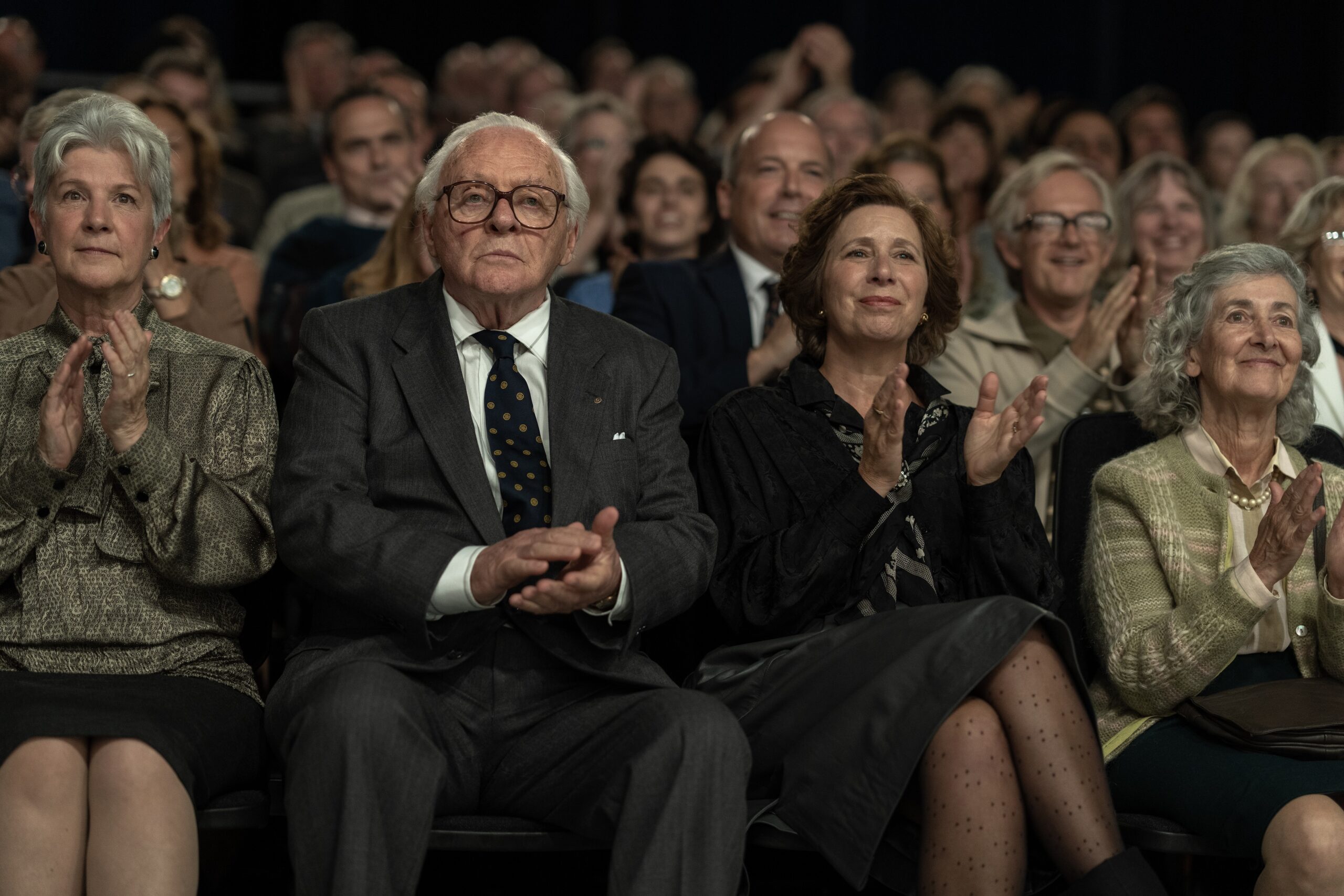
James Hawes spoke with Solzy at the Movies about One Life, the new film telling the story of Nicky Winton and the Kindertransport.
The film is opening this weekend in theaters.

It’s so nice to meet you today. How are you doing?
James Hawes: I’m very well. Nice to meet you too.
I was familiar with the general idea of the kindertransport before watching the film but not with Nicky Winton’s story. How familiar were you with Nicky Winton’s story before coming on board to direct?
James Hawes: I knew—because of the YouTube clip that comes out however many times a year and it just goes viral—I knew the essence of the story. I certainly knew—if you like the last 15 minutes of the movie. What I did not know was the detail of the 75 years before that and how we reached it.
How does it feel to know that One Life’s release is coming at a time when antisemitism is at the worst levels it has been since the Holocaust?
James Hawes: It is, in so many ways, a painful moment to be releasing a film like this. We would never wish for a film that deals with such important topics to be a landing when it seems to be acutely needed. I think it’s about even more than antisemitism. Obviously, that is a key discussion right now. But it’s also about what it means to be a refugee. It’s about the value of one human life beside another. It’s about how we deal tribe to tribe with our neighbors. We haven’t made a lecture here. We haven’t crafted a sermon. We told a powerful human story that seems to speak to the moment with an unfortunately tiny power.
What was the most surprising thing you learned during the process of making this film?
James Hawes: Wow. (Laughs) Honestly, I think the most surprising thing during the process has been to sit in a cinema, in a theater, with several hundred—on a couple of occasions, 2000 people—and be reminded of the immediate power of sharing a story in a room with people rather than just consuming it on a screen at home. Really genuinely, I worried for anything that wasn’t a horror movie or a tentpole piece or a comedy was going to be received post-pandemic by a crowd of people. This just goes to show that if you move people, you really feel it when you get a group together and you go out to the theaters.
Yeah. I watched it on Tuesday night but I had the option of watching it at a local Jewish film festival the next day and watch it with an audience.
James Hawes: Did you?
Like I said, I watched it as a screener.
James Hawes: Okay, you should have done—you need to do both.
I’ve heard from people that saw it on Wednesday and they said there was not a dry eye in the audience.
James Hawes: That’s so exciting to me that we can move people like that. I’m trying to remind people as well that it’s a positive catharsis. This is good emotion—that sometimes, it feels good to be able to release like that and to feel like that. If we—as storytellers—are crafting a story that has that kind of influence and power, then I don’t need anything more. That’s success.
What was it like to direct this cast and how do you handle the transition of Johnny Flynn playing the younger playing the younger Nicky Winton and Anthony Hopkins playing the older Nicky?
James Hawes: Well, let’s talk about that first. I mean, that is a testament, really, to the two actors who extraordinary generous collaborative spirits. Johnny came on set and he watched Anthony at work. He watched some of the details that he was putting into his characterization because the we shot the older Nicky sequences first. And then, it’s about the detail. It’s about finding the gestures, the little rhythms in the voice that we can repeat, without wanting to be a technical exercise that is something that both actors brought from inside to out. Handling that kind of cast well—the key to directing actors is always to respond to the individual. Each actor has a different way of going through their process. Right through the prep to what they want from rehearsal to what they need from you as a director on the set. Some want detailed technical notes, others want to discover the space and geography of the relationships very much organically. It’s finding a mix of those two things, where the director can just do that can guide and enable the actor to the best being.
What was the most challenging aspect of the production?
James Hawes: The most challenging thing was achieving the scale of the story in the time we have or didn’t have—32 days to shoot that film was insane. We had 15 days in the UK, which was largely the old Nikki sequences, and then 17 days in Prague and around the Czech Republic, which involved all train work. Even the London train work was actually filmed in the Czech Republic. It takes a while to reset a steam train so I was chewing my nails a lot of the day just hoping we would make our shots.
Were there any particular challenges in recreating two different time periods?
James Hawes: Well, I think to make them feel honest, you need to feel that those are authentic. The trouble with creating period is it is so beautiful, but it can also so easily feel distant. We wanted to try avoiding it being a heritage piece where everything is like the lid of a chocolate box. We needed it to feel so when we went, for instance, to create the refugee camp, we wanted this to feel we’ve been transplanted and just dumped in this idea industrial ruin. We used a lot of reference, a lot of photographs. It was very, very true to the broad mood and the detail of historically how they looked and where they’d be. And then, to try and avoid romanticize it. There’s this strange that poverty can be photographically beautiful—all the textures and the mishmash and the color tones. It was little things like making the snow feel largely dirty like slush, dressed in on the corners and on the gutters, not some beautiful snowfields, which has a way of looking somehow romantic. Every decision was carefully made to try and convey the story and the danger we wanted at any given moment.
How important was it to have actual descendants of the people that he saved when you all were recreating the TV scene?
James Hawes: Well, I don’t know if it was important, but it became incredibly powerful. We could have told the story with supporting actors, with crowd extras, as traditionally would be the way. I can’t claim that that idea was mine. It was the producers’ idea going back that we should keep that authenticity so that when the presenter, the actress playing Ester Rantzen, says if anybody owes their life to Nicholas Winton, please stand. These people really meant it. These were the children of the children so to see the emotional faces and them feeling what their parents had felt in that moment, it’s just compelling. It was very hard for us as a crew on the set on the day to stay composed and to keep focused because we were all crying as much as they were.
When the film was coming out in the UK, there was some backlash to the initial marketing material not including the fact that most of the refugees were Jewish.
James Hawes: That’s actually slightly mistaken, if I can just correct that. The marketing materials did not do that but some third party materials redrafted and honestly it’s a clumsy piece of writing. I want to say very, very strongly: it was never ever a conscious decision to exclude the word Jewish in any way. What happened was, as you probably know—you do because you’ve clearly done your research was that about 20 children were non-Jewish and they were the children of political opponents or they’d been journalists so somebody, in trying to reduce the number of words, just said of the children that they all came from Europe, rather than trying to say they were mainly Jewish, but also Catholic and Baptist. Backlash would be the right word if it had been a deliberate decision. It really wasn’t. It was a bit of clumsy third party drafting.
Thank you for explaining it to me. I did remember that there was a backlash.
James Hawes: Yeah, well, excuse me for saying that because you would be entirely right to call it a backlash and to be critical of it had that been what happened. It really wasn’t the case.
I mean, I follow a lot of Jewish people on Twitter and Instagram and everyone’s repeating the same things. What do you hope people take away from the production?
James Hawes: I hope they take away a story of the triumph of human spirit and determination. This is in many ways and of course, people have compared it to other movies that that have dealt with the Holocaust story. I hope this is an uplifting movie. I hope you will leave theaters feeling empowered as well as moved and entertained. If you go away thinking, again, about what the definition of a refugee is. I think if you go and think, Wow, even an ordinary person has the ability to do their little piece in changing the world. You can’t all go and be Nicky Winton, but then he started with no knowledge, no resources, because he saw what needed to be done and was determined to try. That’s a lesson. That’s a lesson for us all.
Thank you so much. That was everything I had. It was so nice to meet you.
James Hawes: Thank you very much. Thank you for your interest in it.
No problem.
James Hawes: Have a good day.
You, too.
James Hawes: Bye.
Bleecker Street will release One Life in theaters on March 15, 2024.
Please subscribe to Solzy at the Movies on Buttondown.







